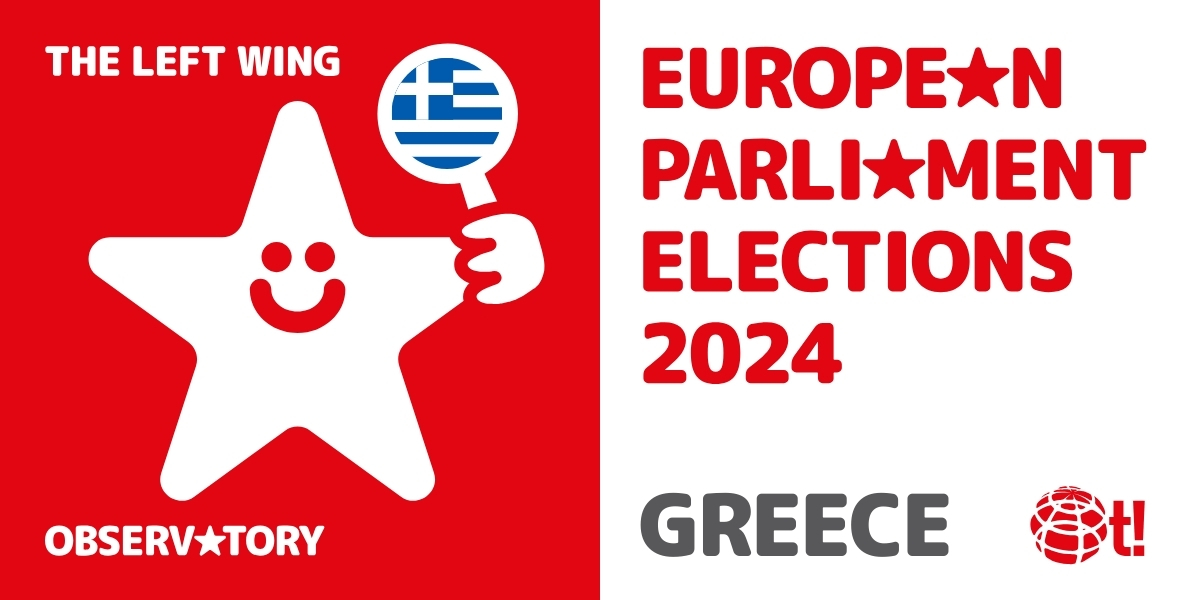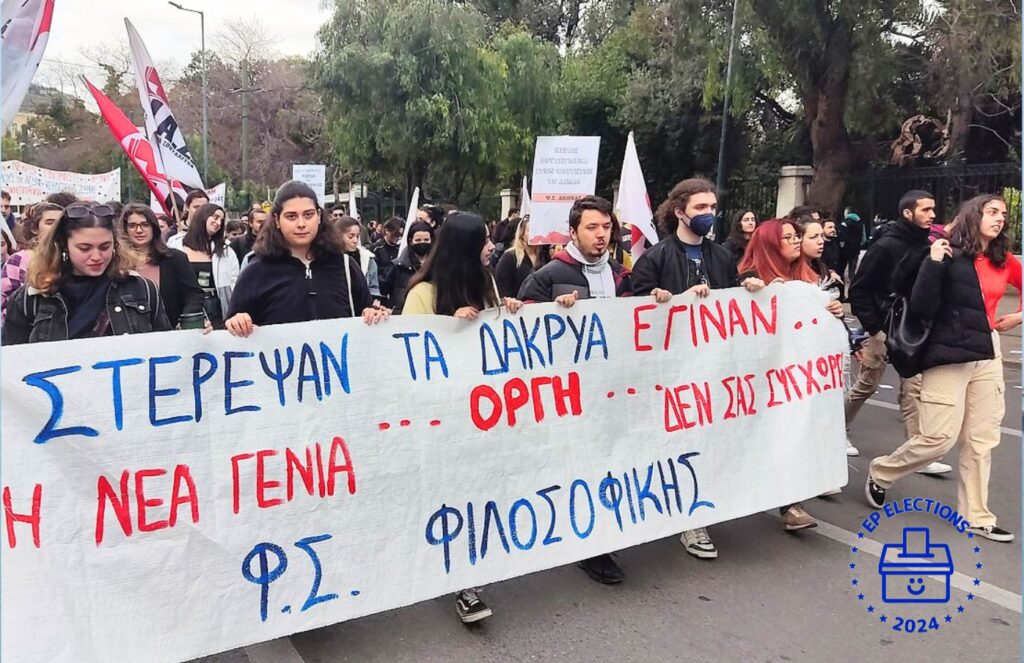
The upcoming European elections will weigh heavily and are expected to shape the balance of power in the Greek political landscape. They also offer an opportunity for the parties to clarify their European priorities. The previous European electoral procedure had overlapped with municipal elections and anticipated an upcoming national election. Now in 2024, it appears that voter decision-making in Greece rests heavily on matters of domestic concern, meaning that parties will focus on their national priorities during leadup to the EP elections.
New Democracy (ND), the party of the neoliberal and traditional right in Greece — and a member of the European People’s Party — has governed the country since 2019 with Kyriakos Mitsotakis as prime minister. It reconfirmed its hegemonic position in the 2023 national elections by winning a parliamentary majority of 158 seats out of 300 (40.55% of voters with 47.3% abstention). The composition of the government also includes ministers who hold far-right attitudes and stances.
Its tenure has been tarnished in many ways: a systematic attempt to cover up scandals and failures (e.g. wiretapping, a train accident at Tempi in the region of Thessaly with 57 death casualties including many students); a targeted attack on what was still remaining of the welfare state after the crisis (including the dismantling of the National Health System and the unconstitutional privatisation of higher education); auctions of houses by debt-management companies after they bought out non-performing (red) loans from the banks at a steep discount; the uncontrolled increase in prices; and the dangerously one-sided foreign policy.
And yet, the failing of the ND government appears as under control to many voters. The provocative support of ND’s policy by many mainstream media outlets largely contributes to this fact. Passing the same-sex marriage bill may have gained votes from the liberal centre, but it rattled the base of the party, which is traditionally conservative. In terms of its political communication strategy, ND makes the most out of the security and national-level issues. In the run-up to the European elections, it has also begun to focus on the hot-button issue that preoccupies citizens the most: the extremely high prices and inflation. In any case, it is expected to see its vote share slightly decrease in these European elections without, however, disrupting either its primacy or the gap between itself and the second-best performing party.
SYRIZA, the largest left-wing party in the country and a member of The Left group in the European Parliament, as well as a party of the European Left, suffered a heavy defeat in the 2023 national elections, with its percentage dropping to 17.83%, yet still kept its position as main opposition. The fact that the party lost a significant portion of its electoral power triggered an internal party crisis. Alexis Tsipras resigned from the party presidency, and with leadership elections open to all party members, the immediate election of a new president followed. Stefanos Kasselakis, who had no prior involvement in the political life of the country or with the internal party structures of SYRIZA, rose to the leadership of SYRIZA, with the declared intention of shifting its political agenda by emphasising individual rights, national issues, and economic liberalism. The developments triggered a new split within the wider left. Party officials, several of them front-line and who also participated in the government in the period 2015-2019, left SYRIZA and formed a new party named “New Left”.
SYRIZA has urged its members and supporters to cast their votes through the iSYRIZA electronic platform to select the candidates who will represent the party in the upcoming European elections. Recent polls indicate that SYRIZA is poised to maintain its position as the second-largest party on the political landscape and is expected to increase its percentage of support compared to previous polls conducted in the winter.
PASOK, a social democratic party, member of the Party of European Socialists (PES) and the SND group in the European Parliament, has never been able to substantially recover after the financial crisis. It tried to take advantage of the intra-party crisis of SYRIZA and claim second place on the political map representing the centre-left, but polls show that it cannot further expand its electoral audience and remains at 10-12%. After all, the content of its political proposals and the movement of its leaders toward New Democracy suggest that the party’s professed centre-left identity continues to raise scepticism.
The Communist Party of Greece (KKE), a traditional communist party, has stabilised and strengthened its presence both electorally and in social spaces and at workplaces with its percentage being currently between 8% and 10%. In its political messaging, it favours the organisation of social resistance against austerity, privatisation, anti-labour laws and repression. However, it is worth noting its particularly conservative attitude during the passing of the bill on the marriage of same-sex couples (it voted against it), as well as its strongly patriotic rhetoric when it comes to topics of geopolitical interest.
The New Left, represented by a parliamentary group of 11 MPs, aims to consolidate its position on the political landscape and secure the election of at least one MEP. Its programmatic agenda underscores the fight against the cost-of-living crisis, the pursuit of social justice, the advocacy of a fair transition to green policies, and the promotion of peace.
Yanis Varoufakis’s MERA25 in alliance with Popular Unity are political formations that both emerged from the departures from SYRIZA after the first half of his government and the referendum in 2015, but they are not represented in the Greek Parliament. The alliance remains under the 3% threshold in the polls, but is attempting to raise its percentage.
Zoe Konstantopoulou’s anti-establishment Course of Freedom (Plefsi Eleftherias with 3.17% in the 2023 national elections), a personality-driven party with ambiguous radical and patriotic rhetoric, is around the 3% threshold in all opinion polls and is very likely to be represented in the European Parliament.
SYRIZA’s MEP, Petros Kokalis, has decided to become independent and has established the ecological party Kosmos, which will run independently in the European elections.
On the far right of the political spectrum, three parties dominated the last national elections: The Hellenic Solution, Niki, and the Spartans, with percentages of 4.44%, 3.7%, 4.68% respectively. The Hellenic Solution, according to opinion polls, will significantly increase its share of the vote, Niki will maintain a stable presence, while the Spartans, due to their relationship with the criminal Nazi organisation Golden Dawn, were excluded from the electoral process by decision of the Supreme Court.
The Greek political system does not have a culture of alliances. Thus, there is little prospect of unity or even programmatic agreements between politically close parties.
According to opinion polls, the second-largest group of voters consists of the “undecided”. Mapping this segment is challenging because there are various reasons explaining why a significant portion of respondents feel disillusioned and do not align themselves with any particular party. Eventually, those who do vote will express their preferences, influenced by the overall sentiment in June, while also considering that their vote may not directly impact the next day’s government.
It is disconcerting that, mirroring the European trend, Greece is experiencing a significant crisis of representation, with citizens increasingly gravitating towards conservatism, leading to a surge in far-right party support. The dynamics of the far-right’s ascent and the traditional right’s decline align with specific social circumstances. While conservative analyses of the far-right’s rise often emphasise immigration, crime, and security concerns, the latest Eurobarometer survey highlights tackling poverty and social exclusion as top priorities for citizens across the EU. Additionally, issues such as public health, climate change, and unemployment feature prominently in citizens’ concerns.
The Question of Europe and Political Priorities
The strategy that the ruling party and the Prime Minister personally seem to be adopting in the lead-up to the European elections is not to present a strong narrative for the elections nor a new political vision for the future, but above all, to compare their proposals to those of the opposition parties (by using the question “Who do you want to represent you in the European Parliament…?”) with constant reference to issues which are challenging to tackle. The burning issue for most Greek citizens is the cost of living crisis. An aggressive increase in the price of basic goods, energy, and rent has not been followed by wage increases, which raises a significant challenge for people trying to make ends meet.
The geopolitical balances are also of great importance for the Greek population and 78% of Greek citizens seem to admit the high importance of participating in the upcoming European elections due to the current geopolitical situation. The fragile situation in the Middle East and the war in Ukraine have increased the interest of European and Greek citizens in the EU compared to the previous European elections, with most Europeans now holding the opinion that the actions of the EU have an impact on their daily lives. It is important to highlight the fact that the interest in the European elections, the awareness about when they will be held as well as the willingness to participate have increased compared to the previous figures gathered in autumn 2023. This fact is encouraging, considering the ignorance towards the European elections in the past years and the traditional high abstention rates.
More than 50% of the people surveyed in Greece would like the political proposals of the pre-election campaign to address public health (56%), supporting of the economy, creation of new jobs (55%) and combating of poverty and social exclusion (55%). Common Agricultural Policy (CAP), defence, and economic competitiveness, are also highly prioritised matters of concern. Respondents in Greece rank as priorities the strengthening of competitiveness, economy, and industry (38%), food security and agriculture (36%), energy (35%).
References
Cover photo: Students in Athens during the national strike of 16 March 2023, by NikosLikomitros, via Wikimedia Commons (CC0).



